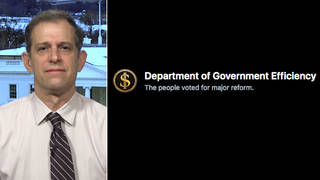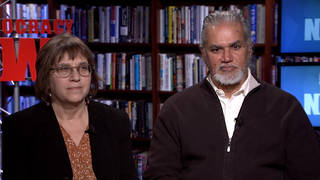HeadlinesApril 07, 2011
NATO Widens Air Assault; Rebels Advance on Brega
NATO has intensified its air campaign against the Gaddafi regime in Libya amidst ongoing clashes on the ground. On Wednesday, NATO warplanes flew around 200 missions in Libyan airspace after rebel leaders accused international forces of failing to protect the city of Misurata. The United States has said that success has been slowed in part by the Gaddafi regime’s use of human shields near military positions. Rebel fighters, meanwhile, have reportedly made advances in fighting near the key oil port of Brega. Both sides have accused the other of bombing Libya’s oilfields. Gaddafi’s forces have attacked oil sites in rebel-held areas after the rebels brokered deals to raise funds for their operations. Libya is accusing British warplanes of bombing a key oilfield and killing a number of workers.
U.S. Dismisses Gaddafi Letter to Obama
The White House has dismissed a new personal appeal from Libyan leader Col. Muammar Gaddafi to President Obama for an end to the bombing. In a letter, Gaddafi called on Obama to stop the NATO-led air attack while also wishing him luck on the 2012 campaign. Appearing with Italy’s Foreign Minister, U.S. Secretary of State Hillary Clinton dismissed Gaddafi’s letter.
Secretary of State Hillary Clinton: “I think that Mr. Gaddafi knows what he must do. There needs to be a ceasefire. His forces need to withdraw from the cities that they have forcibly taken at great violence and human cost. There needs to be a decision made about his departure from power and, as the Foreign Minister said, his departure from Libya. So, I don’t think there is any mystery about what is expected from Mr. Gaddafi at this time. That is an international assessment.”
Hundreds Feared Dead After Boat Carrying Migrants Capsizes
Three hundred people are feared dead after a boat carrying migrants from Libya capsized off the coast of Italy. Around 50 survivors were rescued. The passengers were migrants and asylum seekers from Bangladesh, Chad, Ivory Coast, Nigeria, Somalia and Sudan.
Japan Could Widen Evacuation Zone
Japan is considering extending the evacuation zone surrounding the tsunami-damaged Fukushima Daiichi nuclear power facility. The original 12.4-mile evacuation zone was based on the assumption of short-term radiation exposure risks, but the emergency is nearing its fifth week. Tokyo Electric Power Company says workers have begun streaming nitrogen gas into the plant’s No. 1 reactor to reduce the risk of a hydrogen-oxygen explosion. Meanwhile, Japanese officials have dismissed a claim by Massachusetts Democratic Rep. Ed Markey that the No. 2 reactor core had melted through its containment vessel. Markey says he got his information from the U.S. Nuclear Regulatory Commission.
Reports: Gbagbo Forces Number Less than 1,000
Forces loyal to embattled Ivory Coast leader Laurent Gbagbo have reportedly dwindled to less than 1,000 fighters. Some 200 armed men are said to be protecting Gbagbo’s presidential palace, which is surrounded by forces loyal to internationally recognized president Alassane Ouattara. Gbagbo has refused to step down as president after losing to Ouattara in Ivory Coast’s November presidential elections. Ouattara’s forces attempted to overrun the presidential palace on Wednesday but were driven back. The fighting has brought daily life in Abidjan to a standstill, with millions confined to their homes, stores closed, and food supplies for many people running low.
Leaked Docs Show U.S. Regulators Doubt Nuclear Safety
Newly disclosed documents show U.S. regulators privately doubt that some of the nation’s nuclear power plants can withstand a disaster akin to Japan’s following the earthquake and tsunami. In internal emails and memos, Nuclear Regulatory Commission members have questioned backup plans to maintain cooling systems in case main power sources fail. A July 2010 memo assessing Exelon Corporation’s Peach Bottom nuclear plant in Delta, Pennsylvania, concludes that contingency plans “have really not been reviewed to ensure that they will work to mitigate severe accidents.” The messages were released by the Union Concerned Scientists. In a statement, UCS nuclear expert Edwin Lyman said, “While [regulators] and the nuclear industry have been reassuring Americans that there is nothing to worry about … it turns out that privately NRC senior analysts are not so sure.”
Dems, GOP Claim Progress in Budget Talks
Democratic and Republican leaders claim to have made progress in talks on funding the government and avoiding a federal shutdown. Appearing with House Speaker John Boehner, Senate Majority Leader Harry Reid said the talks would continue before a Friday night deadline.
Senate Majority Leader Harry Reid: “We’ve had a long meeting with the President. It was very honest, we’ve narrowed the issues significantly, and we’re going to continue working. Our staffs are going to work through the night. The Speaker and I will get back together tomorrow morning and see how they did and continue. I have confidence we can get this done. We’re not there yet, but hope lies eternal.”
Wisconsin Judicial Challenger Claims Victory
In Wisconsin, a judicial nominee backed by union groups has declared victory in a closely watched race for a seat on the state Supreme Court. With all votes counted, Assistant Attorney General JoAnne Kloppenburg edged out incumbent and Republican-backed Supreme Court Judge David Prosser by just 204 votes. Prosser is expected to seek a recount. Many saw the race as a referendum on Governor Scott Walker’s anti-union agenda. At a victory news conference, Kloppenburg said Wisconsin voters trust her to be an impartial judge.
JoAnne Kloppenburg: “Their confidence in the court had eroded from the way past elections had been run and from what they had seen of partisanship and distractions of personalities on the court. And they saw from my record at the Department of Justice and from my campaign that I would be independent and impartial. I would help move the court forward, away from partisanship and away from personal quarrels.”
Hundreds of Thousands Protest in Yemen
In Yemen, hundreds of thousands of people marched through the streets of Taiz yesterday in ongoing protests against President Ali Abudullah Saleh. Members of the six-nation Gulf Cooperation Council are now urging Saleh to quit in exchange for their protection. Meanwhile, Amnesty International has urged an investigation into the deaths of more than 100 protesters in the Yemeni government’s crackdown.
Afghan Official Says Talks Underway with Taliban
A top Afghan official has corroborated reports that peace talks are underway with the Taliban. Presidential adviser Mohammad Stanekzai says the negotiations have been going on for some time. He is the highest-level Afghan official to confirm that talks have taken place. Critics have raised speculation that the claims of reconciliation talks have been exaggerated as part of a public campaign to sow division within the Taliban.
Gates Meets Saudi King Abdullah
U.S. Secretary of Defense Robert Gates is in Saudi Arabia for talks with Saudi King Abdullah. It is Gates’s first visit since the Saudi government sent troops into Bahrain to help quell a pro-democracy protest.
Mexicans Protest Drug Violence Nationwide; Mass Graves Found
Tens of thousands of people took to the streets in over two dozen cities across Mexico on Wednesday to demand an end to drug-related violence. The Mexican poet and novelist Javier Sicilia called for the demonstrations after his son, Juan Sicilia, was murdered along with six others in the city of Cuernavaca last month. A demonstrator said Javier Sicilia’s call had inspired Mexicans to speak out.
Protester: “This civil expression is for everything that we have been suffering in Mexico, this upheaval that is not ending and needs to stop. Unfortunately, the violence in Mexico is something disproportionate. It is something that shouldn’t be happening. It is enough, enough for us, the citizens. We are fed up with this truly not having any end. The incident in Cuernavaca, I believe, has been the wildfire that unfortunately has us saying, 'Enough already.'”
The demonstrations came as dozens of bodies were discovered near Mexico’s border with the United States. Mexican prosecutors say 59 bodies were found in a series of graves in the state of Tamaulipas. More than 37,000 people have died since President Felipe Calderón declared a war on drug traffickers in 2006.
Israel Bombs Northern Gaza, Wounds Civilians
The U.S.-backed Israeli military continues to carry out attacks on the Gaza Strip. On Wednesday, two civilians, including a pregnant woman, were wounded when Israeli warplanes bombed areas in northern Gaza. A Gaza resident’s home was damaged in an overnight strike.
Resident: “It’s a shame. It’s the second time already. May God help us and send people to help us. I have children of three, four and five years old, and the glass showered on them, and they couldn’t see anything. This is the second time, and we pray to God and the people to help us and stop this thing.”
U.S. Resumes Deportations to Haiti
The U.S. government has begun deportations to Haiti after a two-month freeze. The deportations initially resumed in January, one year after they were halted in the aftermath of the devastating earthquake. But the freeze was re-imposed after a Haitian national died of cholera-like symptoms just weeks after he was deported, and several other deportees also fell ill upon their return to Haiti. U.S. Immigration and Customs Enforcement says it has issued revised guidelines to focus on Haitians convicted of violent crimes and who are repeat offenders. But critics say the first wave of deportees will mostly have already served their prison sentences without further incident.
Most popular
- 1
- 2
- 3
- 4
Non-commercial news needs your support
Please do your part today.











Media Options